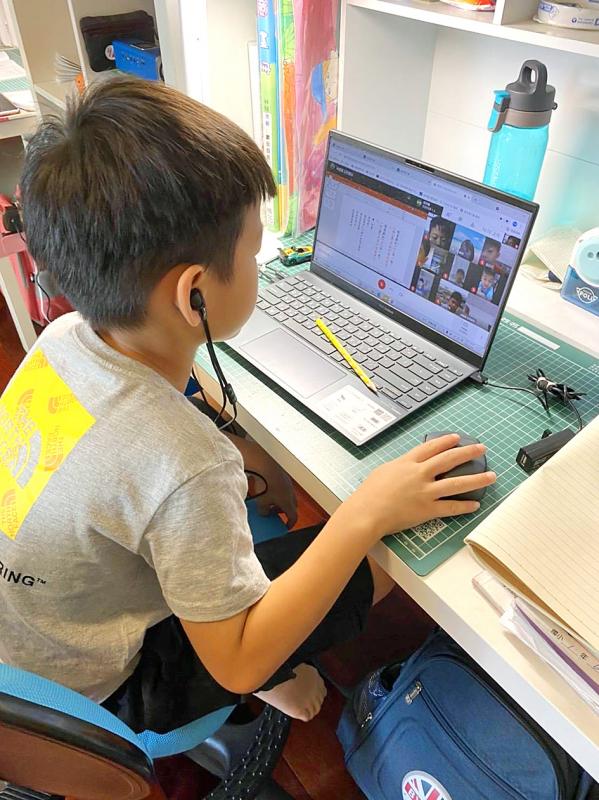Schools should limit online classes to half the length of normal classes so that students spend less time in front of screens, the Ministry of Education said in a statement on Saturday.
As schools have transitioned to distance learning amid a heightened COVID-19 alert level, the ministry said that class lengths should be reduced to 20 to 25 minutes to protect students’ eyesight.
Teachers can use pre-recorded videos, public-domain content and other online resources via communications software to teach students the curriculum during the school closure, the ministry said.

Photo courtesy of the Kaohsiung Education Bureau
Classes for students in elementary school would still last 40 minutes, while classes for students in junior-high school would last 40 minutes, it said, but half of the class time could be used to read, do written assignments or present oral reports.
Teachers can also remind students at regular intervals to stretch or do eye exercises to protect their health while studying from home, it said.
In 2019, Taiwan had an estimated 500,000 nearsighted students in elementary schools, Ministry of Education data showed.
Taoyuan-based physician Wang Chang-chi (王璋驥) on Saturday said that the number would likely increase if the virus situation requires distance learning over an extended period.
“Nearsightedness is irreversible, so it is better to prevent it from occurring in the first place. Long-term exposure to light puts a heavy burden on the macula and can lead to ciliary spasms,” Wang said, adding that excessive use of electronic devices can cause eye fatigue and headaches.
When people’s eyes are tired, they should take a break from electronic screens and look off into the distance, he said, adding that broccoli, spinach and other foods rich in lutein are good for the eyes.
“While studying at home, students should find a brightly lit space to work,” physician Chang Wen-jui (張文瑞) said.
People are also advised to take a break of at least 10 minutes for every 30 minutes of screen time, Chang said.

Three Taiwanese airlines have prohibited passengers from packing Bluetooth earbuds and their charger cases in checked luggage. EVA Air and Uni Air said that Bluetooth earbuds and charger cases are categorized as portable electronic devices, which should be switched off if they are placed in checked luggage based on international aviation safety regulations. They must not be in standby or sleep mode. However, as charging would continue when earbuds are placed in the charger cases, which would contravene international aviation regulations, their cases must be carried as hand luggage, they said. Tigerair Taiwan said that earbud charger cases are equipped

Foreign travelers entering Taiwan on a short layover via Taiwan Taoyuan International Airport are receiving NT$600 gift vouchers from yesterday, the Tourism Administration said, adding that it hopes the incentive would boost tourism consumption at the airport. The program, which allows travelers holding non-Taiwan passports who enter the country during a layover of up to 24 hours to claim a voucher, aims to promote attractions at the airport, the agency said in a statement on Friday. To participate, travelers must sign up on the campaign Web site, the agency said. They can then present their passport and boarding pass for their connecting international

UNILATERAL MOVES: Officials have raised concerns that Beijing could try to exert economic control over Kinmen in a key development plan next year The Civil Aviation Administration (CAA) yesterday said that China has so far failed to provide any information about a new airport expected to open next year that is less than 10km from a Taiwanese airport, raising flight safety concerns. Xiamen Xiangan International Airport is only about 3km at its closest point from the islands in Kinmen County — the scene of on-off fighting during the Cold War — and construction work can be seen and heard clearly from the Taiwan side. In a written statement sent to Reuters, the CAA said that airports close to each other need detailed advanced

The age requirement for commercial pilots and airline transport pilots is to be lowered by two years, to 18 and 21 years respectively, to expand the pool of pilots in accordance with international standards, the Ministry of Transportation and Communications announced today. The changes are part of amendments to articles 93, 119 and 121 of the Regulations Governing Licenses and Ratings for Airmen (航空人員檢定給證管理規則). The amendments take into account age requirements for aviation personnel certification in the Convention on International Civil Aviation and EU’s aviation safety regulations, as well as the practical needs of managing aviation personnel licensing, the ministry said. The ministry